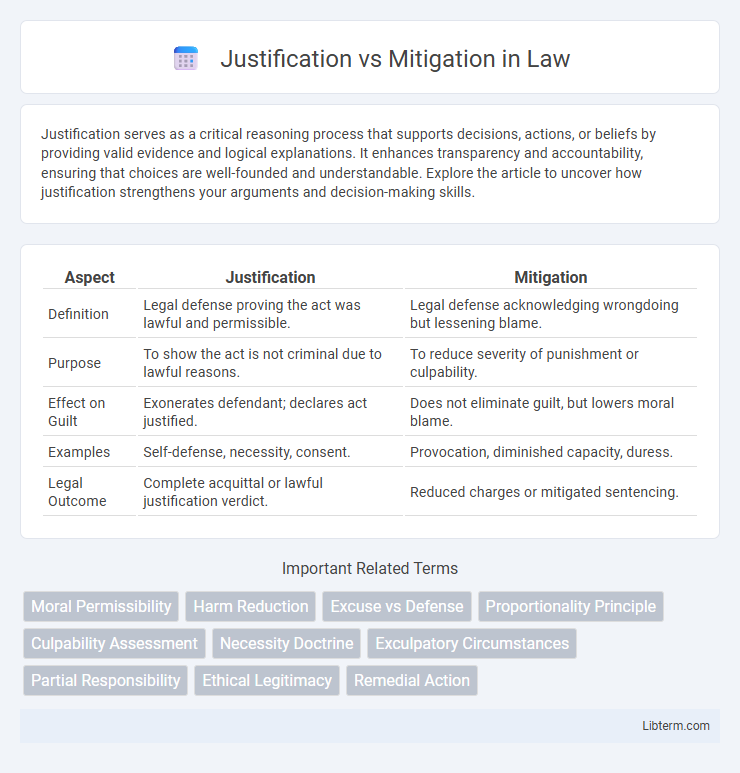Justification serves as a critical reasoning process that supports decisions, actions, or beliefs by providing valid evidence and logical explanations. It enhances transparency and accountability, ensuring that choices are well-founded and understandable. Explore the article to uncover how justification strengthens your arguments and decision-making skills.
Table of Comparison
| Aspect | Justification | Mitigation |
|---|---|---|
| Definition | Legal defense proving the act was lawful and permissible. | Legal defense acknowledging wrongdoing but lessening blame. |
| Purpose | To show the act is not criminal due to lawful reasons. | To reduce severity of punishment or culpability. |
| Effect on Guilt | Exonerates defendant; declares act justified. | Does not eliminate guilt, but lowers moral blame. |
| Examples | Self-defense, necessity, consent. | Provocation, diminished capacity, duress. |
| Legal Outcome | Complete acquittal or lawful justification verdict. | Reduced charges or mitigated sentencing. |
Understanding Justification and Mitigation
Understanding justification involves recognizing valid reasons or explanations that legitimize a decision or action within ethical, legal, or organizational frameworks. Mitigation focuses on reducing the negative impact or severity of an issue, often through proactive strategies or corrective measures. Both concepts are essential in risk management, compliance, and conflict resolution to balance accountability with problem-solving.
Key Differences Between Justification and Mitigation
Justification involves providing valid reasons or evidence to support an action or decision, emphasizing its correctness or necessity, while mitigation focuses on reducing the severity or impact of negative consequences associated with that action. Key differences include justification addressing why an action is acceptable or required, whereas mitigation seeks to minimize harm or risks after the action is taken. Justification is proactive reasoning, whereas mitigation is a reactive strategy for damage control.
The Role of Justification in Decision-Making
Justification plays a critical role in decision-making by providing a rational basis for actions, ensuring choices align with ethical standards and legal requirements. It supports transparency and accountability, enabling stakeholders to understand the reasoning behind decisions. By clearly articulating the reasons for a decision, justification enhances trust and facilitates effective communication among all parties involved.
Why Mitigation is Essential in Risk Management
Mitigation is essential in risk management because it actively reduces the probability and impact of potential risks, safeguarding organizational assets and ensuring continuity. Unlike justification, which rationalizes existing risks, mitigation implements strategic controls such as process improvements, technology upgrades, and contingency planning to prevent or minimize adverse outcomes. Effective mitigation enhances resilience, lowers financial losses, and supports compliance with regulatory requirements, making it a critical component of proactive risk management frameworks.
Common Scenarios Requiring Justification
Common scenarios requiring justification often involve ethical dilemmas, regulatory compliance, and risk management decisions where actions deviate from standard procedures. Justification is necessary when organizations must prove that an exception or risky behavior is warranted based on context, such as in medical treatments, environmental impact assessments, or financial audits. This process ensures accountability and transparency by providing a reasoned explanation supported by evidence or policy frameworks.
Effective Mitigation Strategies and Techniques
Effective mitigation strategies prioritize risk reduction by implementing preventive controls, such as robust encryption, multi-factor authentication, and regular security audits. Techniques like vulnerability assessments, continuous monitoring, and incident response planning significantly limit potential damage and ensure rapid recovery. Mitigation focuses on managing and minimizing threats rather than simply justifying risk acceptance.
Legal Implications: Justification vs Mitigation
Justification in legal contexts serves as a complete defense, rendering the defendant's actions lawful under specific circumstances such as self-defense or necessity, thereby negating criminal liability. Mitigation, conversely, acknowledges the defendant's culpability but seeks to reduce the severity of the punishment by presenting factors like remorse, lack of intent, or provocation. Understanding the distinction between justification and mitigation is critical for legal practitioners when formulating defense strategies and anticipating sentencing outcomes.
Ethical Considerations in Justification and Mitigation
Ethical considerations in justification require a thorough assessment of whether an action's benefits outweigh its harms, ensuring respect for human rights and equitable treatment. Mitigation focuses on minimizing negative impacts through proactive measures and accountability, emphasizing transparency and responsibility to affected stakeholders. Both concepts demand rigorous ethical scrutiny to balance risk and benefit while upholding moral principles.
Case Studies: Applying Justification and Mitigation
Case studies applying justification and mitigation demonstrate how organizations evaluate the ethical implications of their actions by either proving the necessity of potentially harmful practices or actively reducing adverse effects. In environmental management, justification might involve showing economic benefits that outweigh ecological damage, while mitigation focuses on steps like reforestation and pollution control to lessen harm. Healthcare case studies reveal justification through prioritizing critical treatment despite risks, whereas mitigation manifests as implementing safety protocols to minimize side effects and complications.
Choosing the Right Approach: Justification or Mitigation?
Choosing the right approach between justification and mitigation depends on the nature and impact of the risk or issue at hand. Justification is effective when the benefits outweigh the risks and clear evidence supports proceeding despite potential drawbacks. Mitigation is essential when risks can be reduced or managed to acceptable levels, ensuring safety and compliance while minimizing adverse outcomes.
Justification Infographic

 libterm.com
libterm.com